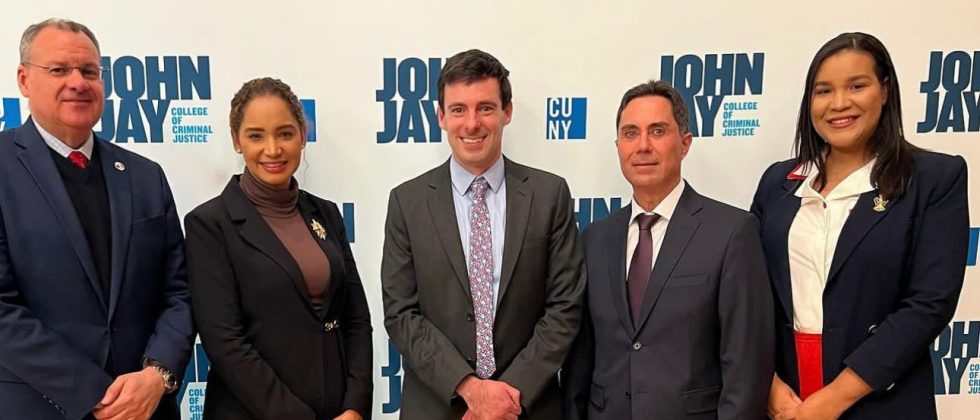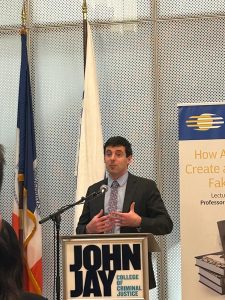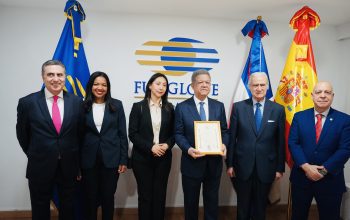news
The Global Foundation for Democracy and Development (GFDD) & Fundación Global Democracia y Desarrollo (FUNGLODE) in partnership with John Jay College, host lecture on ‘How Algorithms Create and Prevent Fake News.’
November 30, 2023
On November 28, The Global Foundation for Democracy and Development (GFDD), in collaboration with the Fundación Global Democracia y Desarrollo (FUNGLODE) and John Jay College of Criminal Justice, hosted a lecture at College’s campus in Manhattan, exploring the opportunities and significance of international governance of artificial intelligence (AI) in the context of Fake News.
The lecture, titled ‘How Algorithms Create and Prevent Fake News,’ featured Professor Noah Giansiracusa as the keynote speaker. Professor Giansiracusa, an esteemed author and AI expert, underscored the imperative of identifying and preventing the malicious use of AI, which, as highlighted by the UN Secretary General, can potentially “undermine institutions, weaken social cohesion, and even threaten democracy.”
 Professor Giansiracusa made emphasis on the challenges and opportunities of this phenomenon, he argued that algorithms, including AI, are not the only source of our problems around mis- and disinformation, but they are also not the full solution. They are part of both.
Professor Giansiracusa made emphasis on the challenges and opportunities of this phenomenon, he argued that algorithms, including AI, are not the only source of our problems around mis- and disinformation, but they are also not the full solution. They are part of both.
Addressing the targeting of fake news through AI-based algorithms, Professor Giansiracusa emphasized the need to understand and identify algorithms capable of addressing the challenges posed by fake news in the digital era dominated by major tech companies.
‘The scale of the internet is so immense that we have no choice but to use algorithms to curate the information we see, even though there are many known problems with doing this.
Tech companies do not try to create societal problems, but many are so large and powerful that even small mistakes and carelessness has a big impact on society.’
Professor Giansiracusa remarked, “From searching on Google to scrolling through social media to chatting with ChatGPT, we all frequently turn to the internet to find information about the world. This information is shaped by hidden algorithms controlled by tech companies.” He further explained how individuals, even those without technical expertise, can discern these trends.
‘It is very difficult to encourage positive uses of technology while limiting the harms, but we must all individuals, corporations, governments, and international organizations work together to do our best at this.
Rather than focusing just on what is true versus false, we should look to the ways that our information ecosystem is manipulated for political and financial gain.
A considerable amount of fake news is done for financial, rather than political reasons. Accordingly, one way to reduce it is to work harder to defund it.’ He stated.
In the modern context, we observe the ongoing influence of emerging technologies, notably Artificial Intelligence (AI), on various facets of our societies. This impact spans across education, entertainment, and the methods through which we seek information, including news. Acknowledging this transformative landscape, Rodolfo Fuertes, the Executive Director of GFDD, underscored the organization’s awareness of these changes and acknowledged the imperative to further advance the ongoing debate. GFDD actively organizes lectures and conferences aligned with the United Nations’s initiative on Artificial Intelligence, with a specific focus on exploring opportunities and aspects of international governance.
Looking ahead, GFDD remains committed to reviewing emerging trends in AI, with plans to engage new stakeholders in ongoing discussions in the coming year.
About the organizers
The Global Foundation for Democracy and Development (GFDD) is headquartered in New York City and was established in 2002 by the former President of the Dominican Republic, Dr. Leonel Fernández. GFDD, along with its sister organization Fundacion Global Democracia y Desarrollo (FUNGLODE), in the Dominican Republic, operates as a think-tank dedicated to supporting the initiatives of the United Nations, particularly those related to the 2030 Development Agenda. With satellite offices through
As a non-governmental organization, GFDD has held Special Consultative status with the Economic and Social Council (ECOSOC) since 2013. Moreover, GFDD boasts consultative status with various UN bodies, including the UN Conference on Trade and Development (UNCTAD), the Department of Public Information (DPI), the Global Compact Office, the Office on Drugs and Crime, and the World Summit on Information Society (WSIS), as well as the United Nations Institute for Training and Research (UNITAR). More information about GFDD can be found on their website: http://www.globalfoundationdd.org/.










